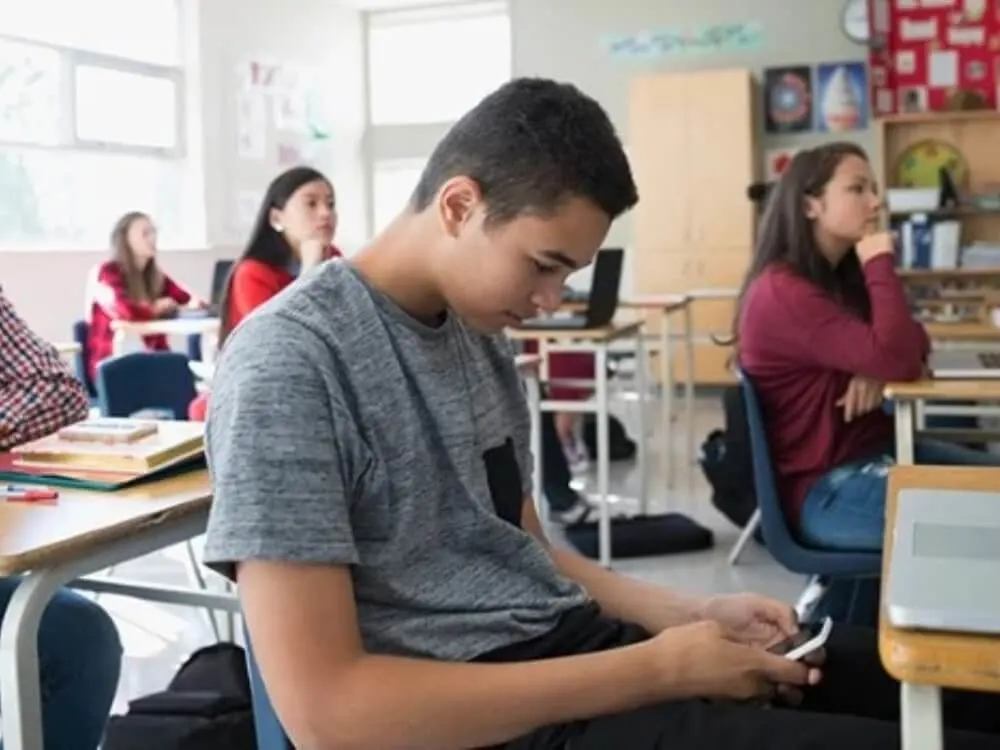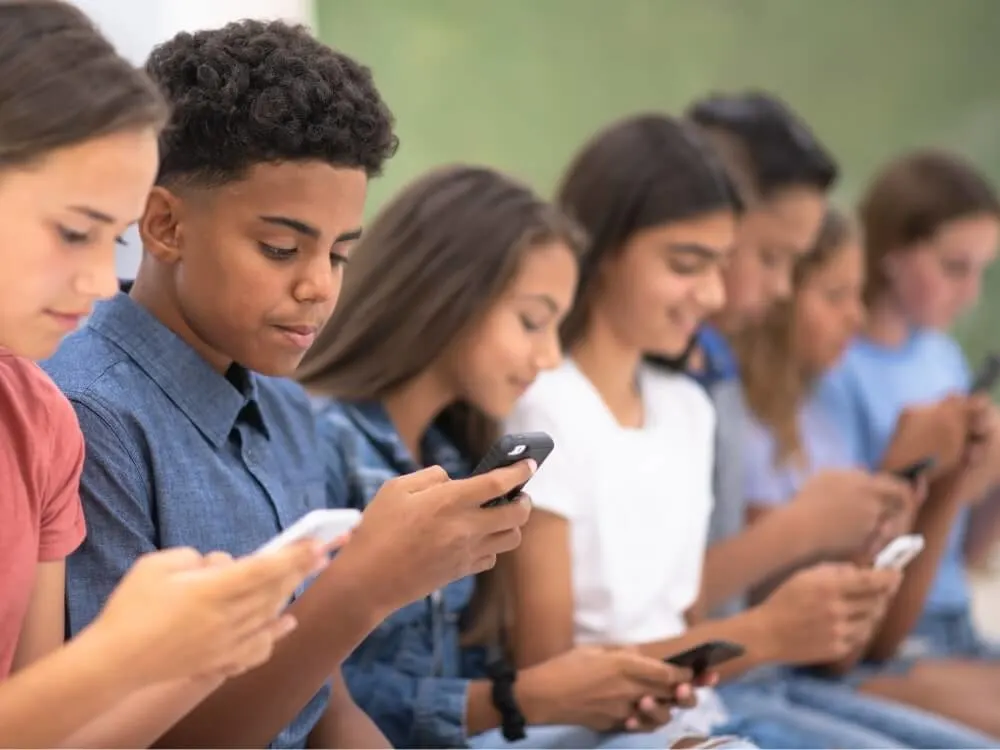Allow me to take you on a journey back in time to before the rise of mobile phones in classrooms. Call this a whimsical misadventure to see why phones should NOT be allowed in schools.
When I first started teaching in 2007, most kids did not have a smartphone. We also did not have Smartboards in any of the classrooms. It wasn’t hard to hold their attention.
A piece of clipart on the overhead projector or a discussion about the pressures of the college application process was enough to keep most of them engaged. Phones and infinite access to the wonders of YouTube and TikTok were not a thing. Attention spans weren’t yet a thing of the history books.
Ten years later, the lengths teachers must go to hold students’ attention are almost comical. Sometimes I feel like a circus monkey, juggling flashy GIFs and funny memes before their eyes, hoping they forget about their phone for two minutes. No such luck.
We are living in the attention economy, and teachers are living at the bottom of the socioeconomic brackets. Phones in classrooms are utter frustration.
And this has only further eroded the impact teachers can make.
Revel in the misery with me. Should phones be allowed in classrooms and schools?
Surely not, right?
Ya damn right they shouldn’t! And that’s Ms Shirley to you.

Why Phones Should NOT Be Allowed in School:
Phones, Classrooms, and the Quest for Relevance
With engagement dwindling, more and more teachers have to personally relate everything to students. They need to make it “hip” for kids to care.
But how could you ever do that? It’s all been done before!
Trying to make Shakespeare cool? Don’t even bother with that hip-hop artist who uses Shakespeare as lyrics. They’ve already liked and shared it – they’re not impressed.
Perhaps you could try pointing out that scene in Hamlet when the main character asks to put his head in his girlfriend’s lap. He calls it “country matters”. Many experts believe this is a sneaky reforming of the word “c***”!
They might lift their head up and ask what you just said…for a moment. A student once told me he would never forget that detail. Maybe he’ll bring it back as a funny zinger in sex ed class.
That’s cool, but did he absorb anything else? Your guess is as good as mine.

Competing with ballooning screentime, I feel the pressure to keep everything I teach “cool”, and it’s hard to keep up. But if I don’t, I will lose them, like many of my much older colleagues. I don’t ever want my students to view my class as useless, and I fear that is how many view school in general.
Sometimes, no matter how flashy and edgy my lessons are, it still doesn’t hold their attention. It can never be as exciting and relevant as the bullshit their friends are posting on social media. And all I’m left with is the unending frustration of phones in classrooms.
“Why don’t you just take their phones away?” you ask. I often do. That’s where many of them simply put their heads down and cash out.
I once even, in a moment of frustration, shouted at a class that I could be showing porn in class and they would still be looking down at their phones because they have better porn on their own phones! A few kids laughed, and one or two heads popped up.
“Did she just say something about…?” But most kept their heads down.
Sometimes when a kid is on their phone, I will just ask them what they are doing. “Nothing, sorry,” they reply.
“No seriously, I want to know what is so engrossing. What exactly are you doing?” I continue.
Nine times out of ten, they are on Snapchat or TikTok, posting pictures of their actions in real-time. But what are they actually doing? Not much.

One time I gave out donuts for whatever reason, and at least five kids snapped it immediately. When I’m about to show a movie, many phones come out to document the excitement of movie time. Ironically, they don’t even plan on watching the movie.
I once wanted to reward a class by letting them choose the movie they would watch. I gave them a vote, and it was very heated. They fought adamantly for the film they thought was the most worth watching.
When we finally reached a consensus, and I played the film, about 75% of the class began watching their selections with headphones. I couldn’t believe it.
Do I need to be stricter about the phones? Yes. And I have been.
It’s only caused me unnecessary amounts of teaching-related stress and health-destroying aggravation. When the administration has no consequences, how can we, the teachers, enforce any rules?
I used to have a hanging chart with pockets for each phone. Students would never voluntarily put their phones in their pockets. I would have to argue with each student separately. discussing why they shouldn’t have their phone in the classroom at the beginning of each lesson.
Some students are so protective of their phones that it mirrors a physical addiction. If you try to take away their drug, they react like a drug addict who can’t get their next fix. I couldn’t take the frustration anymore.
To be fair, if the admin tried to discipline kids for having mobile phones in school and class, there would be long lines of angry students pouring into the office all day. They don’t have the resources to handle that.
The phone addiction of students is beyond extreme. It’s a very fair reason to quit teaching and one of the main ones I do not want to teach anymore!

Phones and social media have crept into every aspect of a teenager’s life. Remember when you had to work up the nerve to ask someone out? Now you just “slide into their DMs”.
Remember when you had to have the balls to call someone’s house and ask their mom if they could talk? Now you just send a text at any time of day or night.
Remember that time you talked to your crush for hours on the phone until you finally built up the nerve to talk in person or go on a date? Now you text, send emojis, and like their pics. Maybe comment, if you’re feeling brave.
Sending someone a direct message on social media is actually considered to be pretty ballsy these days. Can you imagine? The way kids interact is entirely different than it has ever been, and it will inevitably change our world. It already has.
And yet our school system and curriculum have barely changed at all. Mobile phones in classrooms are a recipe for complete frustration and failure with poor results every time.
Get the Books That Started It All
Before the blog, the podcast, the merch store… there were the best-selling books.
If you like the content on this site, then you’ll LOVE the Teacher Misery books. They’re jam-packed with teaching insanity, ridiculous true stories, and all the commiseration about the profession you’ve come to know, adore, and respect.
Follow the links below to get your copies today!

Kids, Teenagers, and Phone Addiction Statistics: The Facts!
Teen phone addiction is REAL, and it’s coming for your classroom. Well, it’s probably already there.
Here are the facts to prove it!
- The average kid in the United States spends 6.5 hours per day looking at screens, not including classroom or homework screen time.
- Boys spend, on average, the equivalent of 1.5 days on video games every week.
- Recent studies show that screen time increases dopamine production and causes behavior that mimics addiction.
- In 2011, 22% of students starting high school had a smartphone; by 2015, that number surged to 68%.
- “Social networking is engineered to be as habit-forming as crack cocaine,” declared a recent article in Computerworld.
- The American Psychiatric Association (APA) recently added “Internet Gaming Disorder” to the Diagnostic and Statistical Manual of Mental Disorders.
- Many researchers have noted that narcissism seems to be increasing, while empathic traits have been on the decline and have pointed to social media as a driver for that change.
- Across various studies, high levels of media use were related to negative social wellbeing, while face-to-face communication was associated with positive social and emotional outcomes.
Buy Some Merch · Support the Site!
Teacher Misery is by the teachers and for the teachers. Our mission to improve the lives of teachers everywhere.
If you’d like to support the cause, buy yourself (or the burnt-out educator in your life) a gift from our merch store. And, YES, they are all as sarcastic as you’d hope. 😉
Every dollar supports the commiseration!

Phones in Classrooms: What Can Teachers Do?
Technology isn’t going away and schools are at a loss as to how to handle it. The best thing we can do is embrace it and teach kids how to use it properly rather than let it create a toxic classroom environment.
They might be a genius at Fortnite (or FARTnite as I like to call it). But do they know how to research something other than googling it and taking the first thing they find? (We all know the answer to that one.)
Every school should have a formal media literacy class at various grade levels.
Students need to learn to explore online privacy, safety, and communication to better understand who made their media and why. This can empower students to choose which media they engage with and on what terms. They should also be taught the power of words and images online and how they can negatively affect one’s mental health.
Since multitasking online has been shown to be detrimental to one’s productivity, we need to encourage students to do one task at a time. There are online programs that can force a student to only use one computer program and tools. Tools that allow the teacher to monitor what the students are doing online are helpful as well (though quite a daunting task for the teacher).
Strive to bring technology into lessons in a positive way. Tools that empower your teaching ability and engage the kids of the digital age. You’re going to have to get creative to break the spell that classroom phone usage has cast.
It’s advisable because kids pretty much have the attention span of a goldfish now. It’s our main objective to teach them in a specific content area, not break their technology addiction.
Leave that to their parents. ;)



Vikum
Monday 8th of July 2024
As a teacher of IT for over thirty years I noticed a gradual decline of concentration power in students. Back in 1990s where the phones and Internet were non-existent a problem solving situation (such as writing an algorithm to solve a mathematical problem) was fun - the majority participated eagerly and some good answers came out. Now, nothing comes out - no body gives a damn. Instead of using the brain they will resort to the phone and Internet to get an instant solution.
J Sch
Tuesday 26th of March 2024
I agree with this 100%! One way to solve the problem would be for parents not to buy smartphones for their kids. If they are worried about being able to contact them an old fashioned flip phone would work just fine. It is a societal problem that we need to fix.